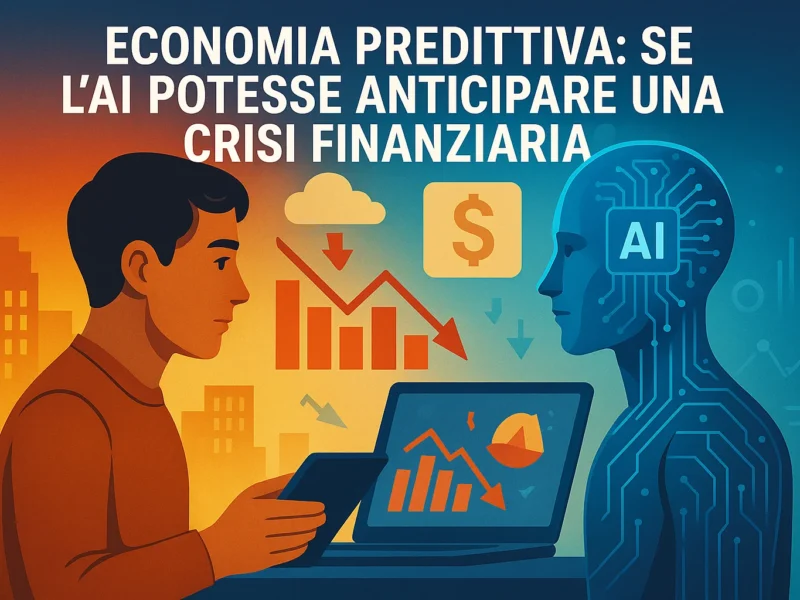We can predict the next economic crisis?
Have you ever wondered if there is a way to predict a financial crisis before it happens? How would it be if we could analyze billions of data points in real time and anticipate the signals of an economic collapse? Today, thanks to artificial intelligence, this possibility is becoming more concrete. But is it really possible to “read the future” of the economy?
What is the economy predictive
The economy predictive is a field that combines economic data, statistical models and artificial intelligence to formulate predictions about future events: inflation, unemployment, instability of the markets. Traditionally, the economic forecast is based on mathematical models of rigid and assumptions of static. With the AI, it can change everything.
The machine learning algorithms can analyze different data flows: financial indicators, journal articles, tweets, satellite images of industrial activities. And they do real-time, looking for correlations that the human eye does not coglierebbe ever.
How does the artificial intelligence in the economy
The AI is part of this process with two main functions:
- Predictive analytics: anticipate economic changes on the basis of models trained with historical data.
- Anomaly detection: identifies weak signals that could indicate a shock in the future, such as a market crash or a systemic crisis.
These models are not perfect, but may increase the response capacity of governments, central banks and firms. A concrete example? The systems of “early warning” developed by institutions such as the IMF and the The World Bank using neural networks to simulate scenarios of the crisis.
👉 IMF – Forecasting with Machine Learning
Real cases and practical applications
In 2008 during the subprime mortgage crisis, none of the traditional tools was able to predict the disaster. Since then, many investment banks and government agencies have started projects economy predictive based on THE.
– BlackRockone of the largest asset managers in the world, uses AI to analyze millions of transactions and anticipating the systemic risks.
– In China, the artificial intelligence is used to monitor the activity of SMES and report in advance signals of recession.
– Also in the Italian public administration, they start talking about predictive systems for the management of public expenditure. The same happens in the companies, where the artificial intelligence is changing the way you analyze data and make strategy, as we explore in The Startup's AI-driven: why new companies focuses on artificial intelligence.
Opportunities... and risks
The economy predictive based on THE promises efficiency, speed and capacity of reaction. But it also entails new risks:
– Opacity of the models: algorithms are not always explicable. It is difficult to understand why a prediction is made.
– Bias in the dataif the data used to train the models contain distortions, these are replicated and amplified.
– Dependence on machines: relying too much on forecast and algorithmic approaches can lead to automated decisions are not always ethical or correct.
The The World Economic Forum he highlighted the importance of a collaborative approach for the governance of AI, highlighting the fact that the technology to go balanced with political accountability, transparency and participation.
👉 WEF – Governance in the Age of Generative AI
The transformation brought by the AI also involves the world of work, she finds herself living with the decisions algorithmic more and more frequent. We talked about it even in the Work 4.0: AI and the revolution professional, where it is highlighted how automation can redefine roles and skills.
Frequently asked questions (FAQ)
The AI can truly predict an economic crisis?
That can recognize the signals of leading with greater speed and magnitude with respect to traditional methods. But can not guarantee certaintyor substitute the critical analysis of the human.
Companies already use these systems?
Yes, especially in the financial sector, logistics and supply chain. More and more companies integrate predictive tools in their decision-making processes.
There is a risk in trusting too much?
Yes. Without transparency and human control, the risk is that decisions are taken on the basis of models of unclear or distorted. Artificial intelligence is a tool, not an oracle.
Conclusion: to provide for better decision making
The economy predictive not tell us with certainty when will the next crisis, but it can help us to be more prepared, more informed, more responsive. The future of the economy will not be determined only by the markets, but also by the algorithms that interpret them.
That's why serves TO transparent, inclusive and regulated. Why predict a crisis is only useful if we know how to also how to react, with humanity and responsibility.
